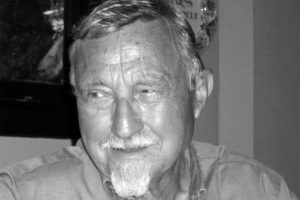Remembering Gene Brucker (1924-2017) and the Department of History Oral History Project
We note with sorrow the passing in July of Professor Emeritus Gene Brucker, historian of Renaissance Florence, one of our esteemed oral history narrators, and the instigator and longtime supporter of our oral history series on the Department of History at Berkeley.
The oral history series had its beginning in 1995, when Gene was designated as the Faculty Research Lecturer. Instead of focusing his lecture on Renaissance Florence, he turned his historian’s eye on Berkeley, on his own department, where he had arrived in 1954 in time to participate in its postwar flowering into one of the most distinguished history programs in the US. In his research he found few remaining written records; surprisingly, the department had discarded a great deal of its own history. He turned to informal interviews with his colleagues to develop his lecture. Later discussion with his friend Carroll Brentano, historian of the University of California and wife of Gene’s colleague, Robert Brentano, led to the idea for an oral history project under the auspices of the Regional Oral History Office, predecessor to OHC. I was fortunate to work with them as the project director and interviewer. For over a decade Gene and Carroll served as project advisors. They convinced their colleagues to themselves become subjects of historical research, and they facilitated the funding that made the project possible.

Among our wealth of oral histories on the University of California, OHC’s series on the Department of History at Berkeley stands out. With lengthy biographical oral histories of nineteen professors of European, American, and Asian history, and one faculty wife, all of whom came to Berkeley in the late 1940s to the early 1970s, it the most extensive of our several series on university departments. And thanks in great part to the vision of Gene Brucker, the interviews are extensive in scope as well: along with a deep dive into the personal background, education, and scholarly trajectories of each narrator, they discuss postwar departmental history in some detail, including governance, key hiring and promotion decisions, curriculum and teaching. And they examine Berkeley’s academic culture, the informal and formal associations and interactions that invariably affect scholarship. They also explore the involvement, often intense in this postwar generation, in broader campus governance and major campus controversies from the loyalty oath, free speech, and antiwar protests to the belated hiring of women faculty in the 1970s.
Having contributed so much to the project, Gene Brucker, a man who really did not like to talk about himself, finally agreed, reluctantly, to record an oral history in 2002. I met with him for eleven sessions, documenting his journey from farm boy in Cropsey, Illinois—via the University of Illinois, Oxford, Princeton, and the Florentine archives—to a career as a distinguished historian of Florence and preeminent citizen of the Berkeley campus. Like others in the series, it is replete with insights into academic culture, the historians’ craft, and the postwar years of growth and tumult on the Berkeley campus. Gene’s oral history and others in the Department of History project. See also “In Memoriam: Gene Adam Brucker”
Ann Lage, interviewer emeritus, October 24, 2017.